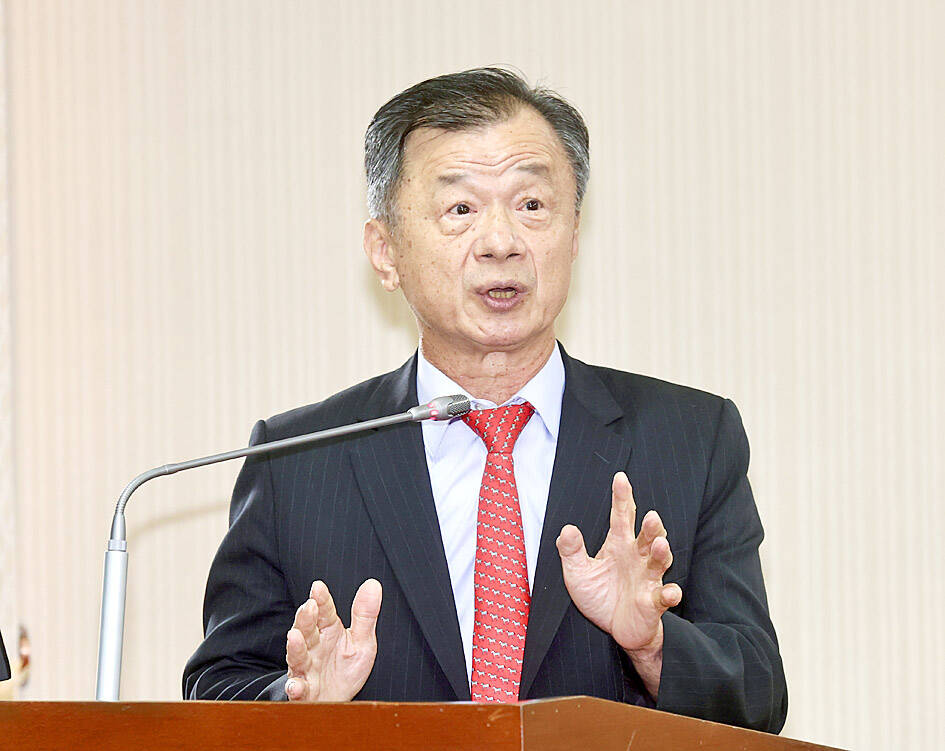Taiwan welcomes Chinese tourists, but Beijing’s ban on travel remains an obstacle, Mainland Affairs Council (MAC) Minister Chiu Tai-san (邱太三) yesterday told legislators when asked why travel from across the Taiwan Strait has not improved.
Chiu made the comments while presenting a report on the situation of tourism between Taiwan and China at a meeting of the legislature’s Internal Administration Committee.
Democratic Progressive Party (DPP) Legislator Su Chiao-hui (蘇巧慧) said that Taiwanese can go to China as an independent tourist, but China prohibits its citizens from traveling to Taiwan.

Photo: CNA
“Beijing is not providing equal treatment for mutual benefits, it only permits a small, restricted opening for local tourists,” Su said, referring the Chinese Ministry of Culture and Tourism last week announcing that it would allow residents of China’s Fujian Province to visit Lienchiang County (Matsu).
“So in the spirit of reciprocity, should we only allow Taiwanese on the Matsu islands to travel in group tours to China’s Fujian? Or maybe also for Kinmen County residents?” she said, adding that both sides must open up and accumulate goodwill before broadening travel.
Independent Legislator May Chin (高金素梅) said that the tourism industry was heavily affected by the COVID-19 pandemic, but with the pandemic over, “the promise for Taiwan and China to open up for tourists has not been realized.
As 220,000 people in Taiwan depend on tourism business, the government should look for ways to stimulate tourism, and not just focus on the semiconductor industry, Chin said.
Chiu said that the main obstruction is China’s ban against its citizens visiting Taiwan.
“Policies on tourism are being evaluated, with changes in cross-strait travel being considered. We hope to have a ‘complete open-door policy’ conducted on the premise of reciprocity for travel between Taiwan and China,” he said.
“Our tourism sector’s 220,000 people who wish to get back on the job, must ask China to allow their tourists to travel to Taiwan. We have since August last year allowed travel from China, but it is the Chinese government that refuses to open up,” he said

Alain Robert, known as the "French Spider-Man," praised Alex Honnold as exceptionally well-prepared after the US climber completed a free solo ascent of Taipei 101 yesterday. Robert said Honnold's ascent of the 508m-tall skyscraper in just more than one-and-a-half hours without using safety ropes or equipment was a remarkable achievement. "This is my life," he said in an interview conducted in French, adding that he liked the feeling of being "on the edge of danger." The 63-year-old Frenchman climbed Taipei 101 using ropes in December 2004, taking about four hours to reach the top. On a one-to-10 scale of difficulty, Robert said Taipei 101

Nipah virus infection is to be officially listed as a category 5 notifiable infectious disease in Taiwan in March, while clinical treatment guidelines are being formulated, the Centers for Disease Control (CDC) said yesterday. With Nipah infections being reported in other countries and considering its relatively high fatality rate, the centers on Jan. 16 announced that it would be listed as a notifiable infectious disease to bolster the nation’s systematic early warning system and increase public awareness, the CDC said. Bangladesh reported four fatal cases last year in separate districts, with three linked to raw date palm sap consumption, CDC Epidemic Intelligence

US climber Alex Honnold left Taiwan this morning a day after completing a free-solo ascent of Taipei 101, a feat that drew cheers from onlookers and gained widespread international attention. Honnold yesterday scaled the 101-story skyscraper without a rope or safety harness. The climb — the highest urban free-solo ascent ever attempted — took just more than 90 minutes and was streamed live on Netflix. It was covered by major international news outlets including CNN, the New York Times, the Guardian and the Wall Street Journal. As Honnold prepared to leave Taiwan today, he attracted a crowd when he and his wife, Sanni,

Taiwanese and US defense groups are collaborating to introduce deployable, semi-autonomous manufacturing systems for drones and components in a boost to the nation’s supply chain resilience. Taiwan’s G-Tech Optroelectronics Corp subsidiary GTOC and the US’ Aerkomm Inc on Friday announced an agreement with fellow US-based Firestorm Lab to adopt the latter’s xCell, a technology featuring 3D printers fitted in 6.1m container units. The systems enable aerial platforms and parts to be produced in high volumes from dispersed nodes capable of rapid redeployment, to minimize the risk of enemy strikes and to meet field requirements, they said. Firestorm chief technology officer Ian Muceus said